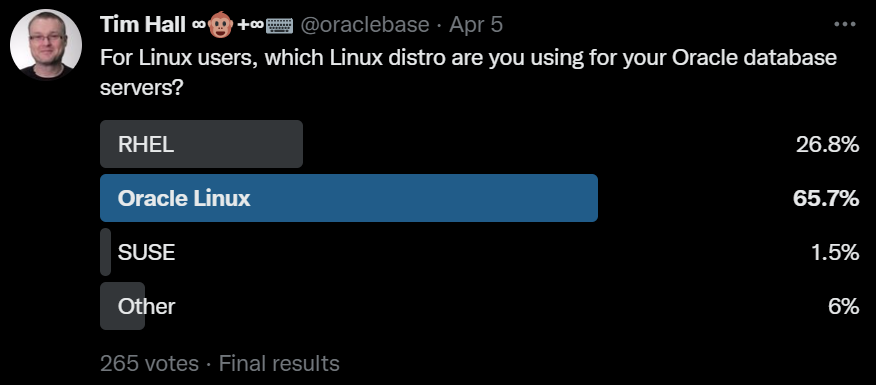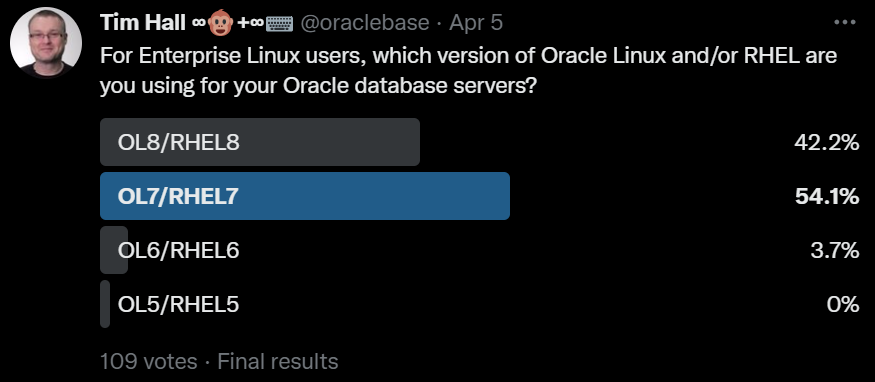
I put out some questions on Twitter a couple of days ago, asking about the operating systems people were using for their Oracle database servers.
As with all these polls, we have to discuss some caveats. Most of the people that follow me are from the Oracle community, so that puts a heavy bias on the outcome. The questions relate to Oracle databases, which also influences the results. Someone may choose one distribution to run Oracle workloads, and a different distribution to run non-Oracle workloads. We also have to remember the sample size is small. Despite this, I’m going to discuss the results as if this were a representative sample of people, even though I accept it may not be. 🙂
This was the first question I asked.

You’ll notice I totally forgot to include Windows, which was a shame because it would have been nice to see that. My main focus was to see how many people were still holding on to the traditional UNIX systems. There was a really strong showing for Linux over UNIX, which was hardly surprising. Every year the dominance of Linux is increasing. A few years back a lot of big companies were still using the traditional UNIX systems, but I guess a lot of people have got sick of spending that sort of cash, and some have probably switched to buying Exadata kit instead. I cant say I’m surprised by this result.
Something I’ve said repeatedly over the years is you should stick to the operating system that is the most popular, as that is the one that is going to get tested the most. There is no point in purposely making yourself a minority IMHO. Having lived through the death of Oracle on Tru64 and HP-UX, I wouldn’t dream of using anything other than Linux now.
This was the next question.

Over 65% of the folks picked Oracle Linux, and about 27% picked RHEL. The fact this is a poll about Oracle database servers no doubt added to the skew in this result. Oracle have done a good job of promoting Oracle Linux, and the fact it is free probably helps a lot. I thought Oracle Linux would be the winner here, but I’m not sure I expected it to be by this much. Personally I wouldn’t run on anything other than Oracle Linux by choice. Remember, this is what Exadata uses, and this is what Oracle Cloud uses.
I suspect some of the people that picked “Other” were speaking about non-production systems. Perhaps I should have made it clear I was thinking about production, not test labs…
This was the final question.

It’s good to see that nobody is owning up to OL5/RHEL5. There are still a few things lingering on OL6/RHEL6, but I guess those are probably running old versions of the database.
OL7/RHEL7 is still the most common version, but I guess a lot of this is down to the long lifespan of database servers. I suspect many of these servers were provisioned some time ago. I’m hoping most new deployments are using OL8/RHEL8.
So nothing really that surprising about the outcome of this batch of questions. Pity I didn’t include Windows in the first question. Maybe next time…
Cheers
Tim…
Hello Tim
We were on RHEL 5 for our EBS R12 12.0.6 until the last upgrade that happened by January end. I couldn’t get the migration partner to agree for OEL 8 & the latest certified version database 19.14 merely because they kept on insisting “everything new have loads of bugs”
This leaves customers many times with an operating system that is reaching end of life/support & database/application versions those are not qualified for long term supports. Once the applications settle down, working “as expected” the business completely stop bothering about whether they have the latest tech in place.
Rajesh: I know that story, and have lived it numerous times… 🙁
I’m super happy when I have to serve customers with Oracle on Windows…
One day I spent three hours researching an error, and it was because I didn’t have ORACLE_HOME in the environment variables.
=D
re: “you should stick to the operating system that is the most popular”, as the saying goes…
“Pioneers get slaughtered, and the settlers prosper.” – Daymond John
Hi Tim,
Is Oracle Linux free?
Erick: Yes. Totally free, including updates. Read this.
https://oracle-base.com/articles/linux/oracle-linux-frequently-asked-questions